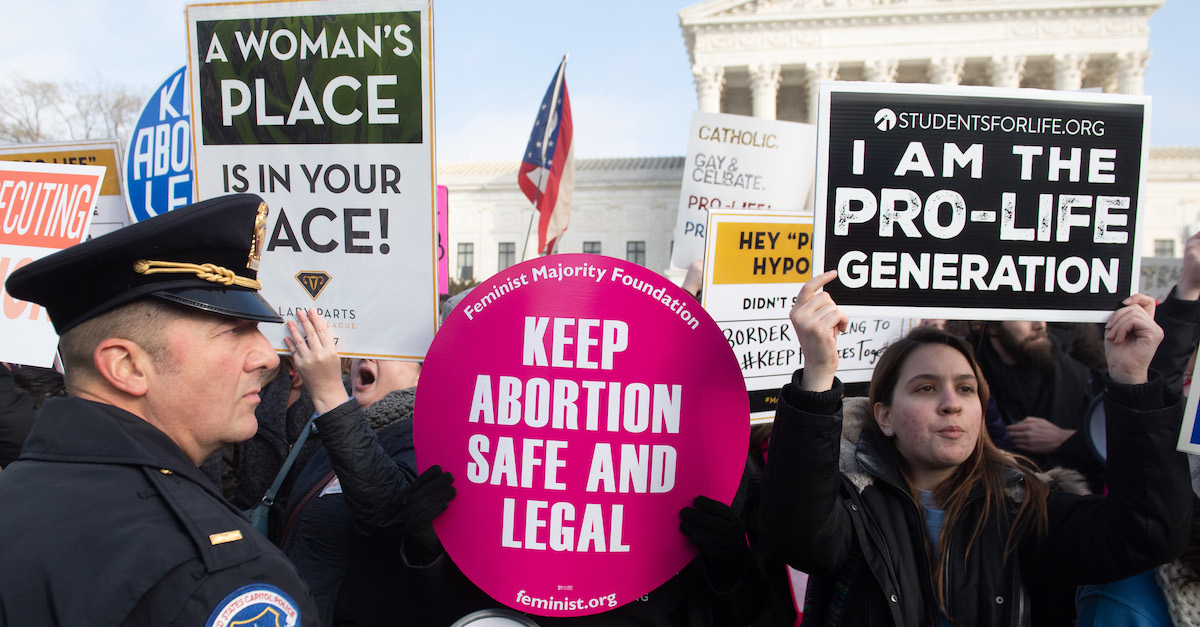
The Fourth Circuit Court of Appeals on Wednesday upheld a North Carolina court’s decision to block the state from enforcing a recently-amended statute that would have placed additional restrictions on access to abortions.
“[W]e agree with the district court that the Providers have established a credible threat of prosecution and therefore have standing to bring this suit,” Judge Diana Motz wrote on behalf of the three-judge panel, affirming the judgment of the district court.
Motz, a Bill Clinton appointee, was joined in the opinion by both Albert Diaz, appointed by Barack Obama, and Julius Richardson, appointed by Donald Trump.
Bryant v. Woodall centered around amendments added in 2015 to the state’s abortion law, which has criminalized abortion as a felony for the past 140 years. Since then, North Carolina added two exceptions to the ban: one for medical emergencies, and another to allow abortions before the 20th week of pregnancy, following the Supreme Court’s 1973 ruling in Roe v. Wade that enshrined the constitutional right to abortion.
The 2015 amendments limited the type of doctors who could perform abortions to “qualified physicians,” narrowed the definition of “medical emergency,” extended the waiting time for an abortion from 24 to 72 hours, added additional inspection requirements, and mandated that abortion providers record and report information such as fetal measurements and ultrasound images to the state.
District Judge William L. Osteen, appointed by George W. Bush, had ruled in March 2019 that the state’s abortion restrictions were unconstitutional and granted the plaintiffs’ Motion for Summary Judgment, thus barring the state from enforcing the law as it applied to previability abortions. Osteen also found that the plaintiff abortion providers had standing to sue.
North Carolina’s argument on appeal wasn’t substantive and didn’t defend the constitutionality of the restrictions. Instead, the state focused on the procedural issue of standing. It said that because no abortion providers had been prosecuted under the law in almost 50 years, there was no “credible threat” – and therefore no risk of injury, a necessary element for standing – to the plaintiffs.
The circuit court, in a unanimous ruling by three judges appointed by three different presidents, disagreed.
While the panel of appellate judges noted Supreme Court precedent that “persistent non-enforcement of a statute” can in fact negate the possibility of a credible threat, the judges found that the circumstances in Bryant are different. In previous cases, people weren’t prosecuted even when it was clear that a particular law was being violated. In this case, however, North Carolina acknowledged that there was no evidence the plaintiffs had performed any illegal abortions, and the court “cannot assume the State’s acquiescence in violations of the law.” This, the court said, could potentially encourage people to risk breaking laws they considered unconstitutional, on the chance they wouldn’t be prosecuted.
“Establishing standing does not require that a litigant fly as a canary into a coal mine before she may enforce her rights,” Motz said.
The court also pointed to the 2015 amendments as evidence that North Carolina does intend to enforce the law, along with the new restrictions.
“[T]he North Carolina legislature’s recent revisions to its statutory scheme suggest that North Carolina has a renewed interest in regulating abortion,” the court said.
“Amidst a wave of similar state action across the country, North Carolina has enacted legislation to restrict the availability of abortions and impose heightened requirements on abortion providers and women seeking abortions,” Motz wrote. “Given these facts, we cannot reasonably assume that the abortion ban that North Carolina keeps on its books is ‘largely symbolic.’”
Some of the defendants had said that “they do not presently intend to enforce the challenged statutes,” while other defendants made no such representations. These statements, and others made by various prosecutors in the state, are “unofficial and non-binding” and do not override the law, the court also said.
In its ruling, the court said it was aware that the country is “deeply embroiled in debate over the legal status of abortion,” after noting the Supreme Court’s decision to hear Dobbs v. Jackson Women’s Health Organization, a case widely seen as a challenge to both Roe v. Wade and Planned Parenthood v. Casey. “While this conversation rages around us, this court cannot say that the threat of prosecution to abortion providers who violate the law is not credible,” the court added.
“This ruling is a victory for all North Carolinians in line with decades of Supreme Court precedent,” said Genevieve Scott, a senior staff attorney at the Center for Reproductive Rights who argued the plaintiffs’ case on appeal. “Forcing someone to continue a pregnancy against their will is a violation of their basic humanity, their rights, and their freedom. Because of this decision, North Carolina is a haven where patients can access abortion even as politicians throughout the South pass dozens of restrictions attacking fundamental rights.”
A spokesperson for the North Carolina DOJ, which argued this case on behalf of the state, told Law&Crime that the department is reviewing the decision.
Read the court’s opinion below:
[image via SAUL LOEB/AFP/Getty Images]